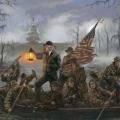Group Rules Updated 11/17/20 If you have not read the updated rules, take a few minutes, and read them. If they are failed to be followed you may be removed from the grou
... MoreGroup Rules Updated 11/17/20 If you have not read the updated rules, take a few minutes, and read them. If they are failed to be followed you may be removed from the group
GROUP RULES: The goal of this group is to have HONEST & RESPECTFUL discussions between the faiths. What follows is the group rules. Please read over them. Moderators hold members accountable to the standards. Do not disrespect the moderators because they have the power to mute your profile and remove you from the group. One thing that we all must remember and practice is love. The two commandments that Jesus left us with is to love God and one another.
This group is for "Orthodox Christians" What we mean by that is the group is designed for people who are Catholic, Protestant or Orthodox that holds to traditional Christian teachings. Examples: The Trinity, Death Burial and Resurrection, Hypostatic Union, and Salvation through Jesus Christ. This list is not meant to limit what is considered Orthodox Christianity. I am to giving a few examples.
Whatever the reason you are participating in dialogue, please remember there a difference between dialogue and debate. For further clarification, here is a chart showing some differences between debate and dialogue.
Please be RESPECTFUL of other people. Just because you disagree does not mean you have to be disrespectful. This includes calling members heretics or unsaved. You may believe that to be true, but usually, that is not the best way to have discussions. Typically it is not something that is practiced in this group. Is there a place for it? Yes, there is, but each member must back up their claims. It is impossible to prove the other person is a heretic apart from appealing to some authority that the other does not accept. Thus ending the statement in a logical fallacy assuming they do not agree with your jurisdiction, and you cannot prove your authority to be an actual authority. In short, let's try to discuss theology without continually calling each other heretics. Everyone in the group claims to trust in the death burial and resurrection of Christ for their salvation.
Let us follow the words of Clement of Alexandria when he says "Let us keep away from us jibing, the originator of insult, from which strifes and contentions and enmities burst forth. Insult, we have said, is the servant of drunkenness. A man is judged, not from his deeds alone, but from his words. “In a banquet,” it is said, “reprove not thy neighbour, nor say to him a word of reproach.”10 For if we are enjoined especially to associate with saints, it is a sin to jibe at a saint: “For from the mouth of the foolish,” says the Scripture, “is a staff of insult,”11—meaning by staff the prop of insult, on which insult leans and rests. Whence I admire the apostle, who, in reference to this, exhorts us not to utter “scurrilous nor unsuitable words.”12 For if the assemblies at festivals take place on account of affection, and the end of a banquet is friendliness towards those who meet, and meat and drink accompany affection, how should not conversation be conducted in a rational manner, and puzzling people with questions be avoided from affection? For if we meet together for the purpose of increasing our good-will to each other, why should we stir up enmity by jibing? It is better to be silent than to contradict, and thereby add sin to ignorance. “Blessed,” in truth, “is the man who has not made a slip with his mouth, and has not been pierced by the pain of sin;”13 or has repented of what he has said amiss, or has spoken so as to wound no one."
10 Ecclus. 31:31.
11 Prov. 14:3.
12 Eph. 5:4.
13 Ecclus. 14:1.
Clement of Alexandria. “The Instructor.” Fathers of the Second Century: Hermas, Tatian, Athenagoras, Theophilus, and Clement of Alexandria (Entire). Ed. Alexander Roberts, James Donaldson, and A. Cleveland Coxe. Vol. 2. Buffalo, NY: Christian Literature Company, 1885. 251. Print. The Ante-Nicene Fathers.
In a dialogue, refrain from logical fallacies, including but not limited to ad-hominem, circular reasoning, non-sequitur, bandwagon, appeal to authority, strawman, red herring, etc.








